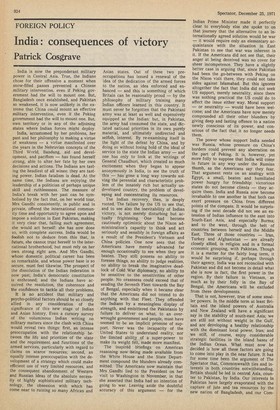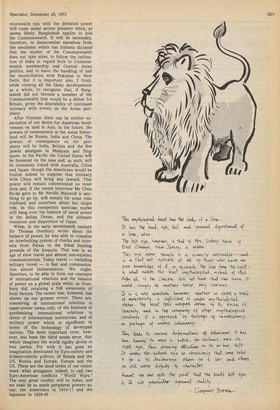FOREIGN POLICY
India: consequences of victory
Patrick Cosgrave
India is now the preponderant military power in Central Asia. True, the Indians chose for their offensive a moment when snow-filled passes prevented a Chinese military intervention, even if Peking government had the will to mount one. But, Bangladesh once established, and Pakistan so weakened, it is now unlikely in the extreme that China could mount an effective military intervention, even if the Peking government had the will to mount one. But, own territory or in any of the adjoining states where Indian forces might deploy.
India, accustomed by her problems, her past and her philosophy to making a virtue of weakness — a virtue manifested over the years in the Nehruvian concepts of the Third World, Bandung, aid and development, and pacifism — has found herself strong, able to alter her fate by her own decisions and actions. The Indians are tasting the headiest of all wines: they are tasting power. Indian fatalism is dead. At the same time, the Indians are enjoying the leadership of a politician of perhaps unique skill and ruthlessness. The measure of India's break with her past can be symbolised by the fact that, on her world tour, Mrs Gandhi consistently, in public and in private, offered the international community time and opportunity to agree upon and impose a solution in East Pakistan, making it very clear that, failing such agreement, she would act herself: she has now done so, with complete success. India would be foolish not to deduce from this that, in future, she cannot trust herself to the international brotherhood, but must rely on her own strong right arm. And Mrs Gandhi, whose domestic political career has been so remarkable, and whose power base is so secure, must feel likewise. The prospect of the dissolution of the Indian federation is now past; India's democratic constitution is enthroned; and the Indians have acauired the resolution, the coherence and the confidence to tackle all their problems.
It is no accident that military and psycho-political factors should be so closely allied in any consideration of the significance of this new stage of Indian and Asian history. Even a cursory survey of the voluminous Indian writing on military matters since the clash with China would reveal two things: first, an intense preoccupation with the relationship between the life and priorities of the state and the requirement and functions of the armed services, particularly with regard to claims on scarce resources; second, an equally intense preoccupation with the development of a strategy which could make efficient use of very limited resources, and the consequent abandonment of Western and Russian ideas of the absolute necessity of highly sophisticated military technology, the obsession with which has come near to ruining so many African and Asian states. Out of these two preoccupations has issued a renewal of the idea of the dedication of the armed forces to the nation, an idea enforced and enhanced — and this is something of which Britain can be reasonably proud — by the philosophy of military training many Indian officers learned in this country. It must never be forgotten that the Pakistani army was at least as well and expensively equipped as the Indian: but, in Pakistan, the army had consumed the state, and dictated national priorities in its own purely material, and ultimately undirected and selfish, interest. By re-examining itself in the light of the defeat by China, and by doing so without losing hold of the ideal of service to the state the Indian army — and one has only to look at the writings of General Chaudhuri, which created so much excitement when they began to appear anonymously in India, to see the truth of this — has gone a long way towards solving the perennial and characteristic problem of the innately rich but actually undeveloped country, the problem of developing and concentrating its resources.
The Indian recovery, then, is deeply rooted. The failure by the US to see that, and to see also the inevitability of Indian victory, is not merely disturbing but actually frightening. One had become cautiously optimistic about the Nixon administration's capacity to think and act seriously and sensibly in foreign affairs as a result of the President's Vietnam and China policies. One now sees that the Americans have merely advanced far enough occasionally to see when they are beaten. They still possess no ability to foresee things, no ability to judge realities, no ability to break the imaginative deadlock of Cold War diplomacy, no ability to be sensitive to the sensitivities of other people. No crassness could exceed that of sending the Seventh Fleet towards the Bay of Bengal, especially when it became Clear that the Americans did not intend to do anything with that Fleet. They offended the Indians by a meaningless display of strength, and embittered the Pakistanis by failure to deliver on what, to an overwrought government and people, must have seemed to be an implicit promise of support. Never was the incapacity of the United States to understand reality, nor the limited ability of a super-power to make its weight felt, made more manifest.
The inspired briefings on American reasoning now being made available from the White House and the State Department compound the blunders already committed. The Americans now maintain that Mrs Gandhi lied to the President on her visit to Washington in November, in that she asserted that India had no intention of going to war. Leaving aside the doubtful accuracy of this argument — for the
Indian Prime Minister made it perfectly clear to everybody else she spoke to on that journey that the alternative to an internationally agreed solution would be war — it would require only an elementary acquaintance with the situation in East Pakistan to see that war was inherent in it. If the Americans did not see that, their anger at being deceived was no cover for sheer incompetence. They have a slightly better case in arguing that, since Pakistan had been the go-between with Peking on the Nixon visit there, they could not take sides against Islamabad. But this ignores altogether the fact that India did not seek US support, merely neutrality, since there was nothing practical the US could do to affect the issue either way. Moral support — or neutrality — would have been welcome; and the Americans have now merely compounded all their other blunders by giving deep and lasting offence to a nation newly conscious of its •power, and conscious of the fact that it no longer needs them.
The power whose support India needed was Russia, whose pressure on China's borders could prevent any aberration on the part of Peking. It is, however, yet more folly to suppose that India will come in future in any way under the Russian thumb, as the Americans say they fear. That argument rests on an analogy with Egypt, a small, beaten and humiliated power hungry for friendship: victorious states do not become clients — they acquire them. India and Russia now become invaluable to one another in that both can exert pressure on China from different points of the compass. It would be surprising if the next decade did not see an extension of Indian influence to the east into South-East Asia, and especially Burma; and to the west, through the belt of countries between herself and the Middle East. Three of those countries — Iran, Turkey and Afghanistan — are already closely allied, in religion and in a formal economic grouping, with Pakistan. Though it is a matter for the fairly long term, it would be surprising if, perhaps through their agency, India was not reconciled with Pakistan and did not become in detail what she is now in fact, the first power in the region. By their failure in Vietnam, as much as by their folly in the Bay of Bengal, the Americans will be excluded from these developments.
That is not, however, true of some smaller powers. In the middle term at least Britain and the island powers of Australia and New Zealand will have a significant say in the stability of south-east Asia; we are still not without weight in the Gulf, and are developing a healthy relationship with the dominant local power, Iran; and we still, of course, enjoy considerable strategic facilities in the island bases of the Indian Ocean. What must now be decided is how all these factors are going to come into play in the near future. It has for some time been the argument of The Spectator that, Commonwealth ties and interests in both countries notwithstanding, Britain should be led in central Asia, counter to Pakistan, by India. Our interests in Pakistan have largely evaporated with the capture of jute and tea resources by the new nation of Bangladesh, and our Corn monwealth ties with the defeated power will come under severe pressure when, as seems likely, Bangladesh applies to join the Commonwealth. It will be necessary, therefore, to disencumber ourselves from the sentiment which has hitherto dictated that the mother of the Commonwealth does not take sides, to follow the inclination of India in regard both to Commonwealth membership and Central Asian politics, and to leave the handling of and the reconciliation with Pakistan to New Delhi. But it is important also, I think, while viewing all the likely developments as a whole, to recognise that, if Bangladesh did not become a member of the Commonwealth that would be a defeat for Britain, given the desirability of continued intimacy with events on the Asian periphery.
After Vietnam there can be neither expectation of nor desire for American involvement on land in Asia. In the future, the powers of consequence in the Asian hinterland will be Russia, India and China, The powers of consequence on the periphery will be India, Britain and the five power amalgam in Malaysia and Singapore. In the Pacific the United States will be foremost on the seas and, as such, will be intimately linked with Australia, China and Japan: though the Americans would be foolish indeed to suppose that intimacy with China will bring any reward. That power will remain concentrated on inner Asia and, if the recent interview Mr Chou En-lai gave to Mr Neville Maxwell is anything to go by, will remain for some time confused and uncertain about her larger role. In this conspectus question marks still hang over the balance of naval power in the Indian Ocean, and the ultimate resources and disposition of Japan.
When, in the early seventeenth century Sir Thomas Overbury wrote about the balance of power, he was able to visualise an interlocking system of checks and interests from Persia to the tribal hunting grounds of the Iroquois. That was in an age of slow travel and almost non-existent communications. Today travel — including military travel — is fast and communication almost instantaneous. We ought, therefore, to be able to form our concepts of international relations and the balance of power on a global scale while, as Overbury did, retaining a full awareness of local factors. The recent war, however, has shown up our grosser errors. These are, conceiving of international relations in super-power terms only, of the business of synthesising international relations in terms of international institutions, and of military power which is significant in terms of the technology of developed nations. The most important error, however, has been the third world error, that which imagines the world rigidly divisa in tres partes. For with it has gone an imagination dominated by Euro-centric and Atlanto-centric politics, of Russia and the US, Russia and Europe, Europe and the US. These are the dead terms of our recent wars: what arrogance, indeed, to call two Euro-American conflicts "World Wars." The next great conflict will be Asian, and we shall be as much peripheral powers as, say, the Americans in 1914-17 and the Japanese in 1939-45.











































 Previous page
Previous page